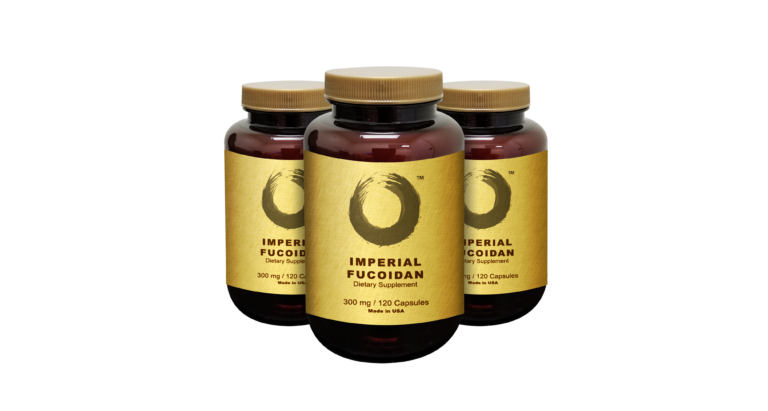

Fucoidan
Fucoidan, also known as sulfated alpha-L-fucan, is a type of sulfated polysaccharide that exists mainly in the cell wall matrix of various species of brown seaweed such as mozuku, kombu, limumoui, bladder wrack and wakame. Various forms of fucoidan have also been recognized in some marine invertebrates such as sea urchins and sea cucumbers. Fucoidan contains galactose, glucoronic acid, xylose and several other major constituents that give the substance its potential health benefits (Memorial Sloan-Kettering Cancer Center). For centuries, seaweeds that fucoidan comes from have been prized for their dietary and therapeutic properties. Their medicinal properties have been particularly well documented in Asian cultures, where seaweeds have been used to address health conditions that range from nausea, congestion, and inflammation through to abscesses and tumors. Despite this long history of seaweeds as medicinal agents, it was not until the twentieth century that fucoidan was first isolated and recognized for its therapeutic potential.
Over the past thirty years there has been an upswell in interest in fucoidan. Most of the scientific evidence supporting the physiological benefits of fucoidan has been obtained during this time, with fucoidan expert, Marinova leading the way. As a result of this research, fucoidan extracts are now used in a variety of applications including dietary supplements, medical devices, veterinary products and topical formulations for skincare/dermatology.
The brown seaweeds containing fucoidan are widely consumed as part of the normal diet in East Asia, particularly Japan, China, and Korea. Fucoidan’s anti-cancer property has been demonstrated in vivo and in vitro in different types of cancers. Nevertheless, it has been rarely investigated for its anti-cancer properties in clinical trials. Fucoidan mediates its activity through various mechanisms such as induction of cell cycle arrest, apoptosis and immune system activation. Additional activities of fucoidan have been reported that may be linked to the observed anti-cancer properties and these include induction of inflammation through immune system, oxidative stress, and stem cell mobilization.
Pharmacokinetics Research of Fucoidan
There are few experimental activities have addressed ADME (absorption, distribution, metabolism and excretion of fucoidan). The confirmation of fucoidan absorption was determined using ELISA with fucoidan-specific antibody. An absorption study was performed on rats using F. vesiculosus fucoidan (737 kDa), while 4 hours after administration, a maximum concentration of fucoidan in serum was reached, which then resulted in the accumulation of the absorbed fucoidan in the kidneys. The fucoidan accumulation in organs has also been confirmed by the absorption of C. okamuranus fucoidan in rats. In addition, authors’ observation from healthy volunteers who either orally ingested or were administered with fucoidan showed that some portion of fucoidan was absorbed by means of endocytosis and was detected both in their serum and urine. It could be mentioned that LMWF (low molecular weight fucoidan) may be further developed to be used for clinical purposes. This is in relation to a comparative investigation LMWF and MMWF (middle molecular weight fucoidan). The outcome was that LMWF presented with a better absorption rate and bioavailability; hence, supporting its biological potential. However, fucoidan may still present with favorable pharmacokinetics in relation to toxicity; the information on its bio distribution in human is still insufficient.
Benefits
Anti-Cancer Capacity
Apoptosis is a physiological process that is known as programmed cell death and is essential for embryonic development and homeostasis in organisms. It can also participate in pathological processes, such as cancer. Therefore, this section follows up on how malignant or cancer cells undergo apoptosis after the administration or stimulation by fucoidan, in different manners (i.e. caspases, cell cycle arrest, intrinsic and extrinsic pathways). C. okamuranus fucoidan (average Mw 75.0 kDa), which consists of 5.01 mg/mL of l-fucose, 2.02 mg/mL of uronic acids and 1.65 ppm of sulfate, has revealed that at the concentration of 1.0 mg/mL, the G0/G1-phase population in Huh7 hepatocarcinoma cell was increased, accompanied by a decrease in the S phase, highly suggesting that fucoidan may cause the cell cycle arrest at the G0/G1.
Therapeutic Potential against HIV
A search for a cure towards HIV has been one of the focal points by a number of scientists worldwide. A breakthrough has been noted in terms of the currently available treatment (in the form of anti-retrovirals) to tame the virus; however, a need still exists to eradicate it completely. The challenge with current treatment is related to side effects, especially during the initial introduction. Current treatments can also be cost-prohibitive, though certain countries subsidize affected individuals. This in turn, places some constraints on governments in terms of exorbitant expenditures in an aim to sustain the lives of the people.
Diabetic and Metabolic Syndrome Control
In recent years, fucoidan has received some intense interest as an agent for treating diabetes and other types of metabolic syndromes (MetS). Fucoidan extracted from F. vesiculosus has been known as a α-glucosidase inhibitor that is able to treat diabetes. Among other studies, fucoidan was mentioned to have an ability to attenuate diabetic retinopathy through inhibiting VEGF signaling. 9 of 15 report of a low Mw fucoidan was noted to provide protection against diabetic associated symptoms in Goto-Kakizaki rats (Mar. Drugs 2019, 17, 487). Fucoidan also improves glucose tolerance by modulating AMPK signaling and GLUT4 activity. Some studies mention that Fuc-Pg (fucoidan from the sea cucumber Pearsonothuria graeffei) with an Mw of 310 kDa can be used as a form of functional food to treat MetS.
Anti-Coagulant Function
Vascular related disease, such as ischemic heart disease, atherosclerosis, and deep vein thrombosis are still among the leading causes of death worldwide. As reported by the World Health Organization, complications associated with these diseases account for over one-quarter of death throughout the world [68]. In most cases, thrombotic related episodes are usually managed by using anti-coagulant and anti-thrombotic medications, such as heparin, a sulfated glycan belonging to the family of glycosaminoglycan’s (CAGs).
Side Effects
Fucoidan occurs naturally and has been consumed by millions in brown seaweed for centuries. It is generally recognized as non-toxic and safe for human consumption. Most people who try it will experience no side effects; although rare, some individuals can have an allergic reaction to brown seaweed and some may experience mild side effects associated with its bioactive functions. In addition, since fucoidan is a rich source of natural fiber, it has also been known to cause minor bloating and loose stools depending on the dosage. This is only temporary and is nothing to worry about, after a while you will return to normal regularity. Lastly, be cautious if you are already taking anti-coagulents, like heparin or warfarin, as it may increase your risk of bleeding.
Who should use it?
Fucoidan research has progressed to show exceptional health characteristics, including: Anti-cancer, Anti-coagulant, Anti-inflammatory, and Immune-enhancing. Talk with your physician before using fucoidan, the material provided is for informational purposes only and is not intended to replace medical advice or to be a treatment for any medical condition. Consult a health professional if you have any concerns about your health.
References
Atashrazm, F., Lowenthal, R. M., Woods, G. M., Holloway, A. F., & Dickinson, J. L. (2015). Fucoidan and Cancer: A Multifunctional Molecule with Anti-Tumor Potential. 2327–2346. https://doi.org/10.3390/md13042327
Fukahori, S., Yano, H., Akiba, J. U. N., Ogasawara, S., Momosaki, S., Sanada, S., … Kojiro, M. (2008). Fucoidan , a major component of brown seaweed , prohibits the growth of human cancer cell lines in vitro. 537–542.
Jiao, G., Yu, G., Zhang, J., & Ewart, H. S. (2011). Chemical Structures and Bioactivities of Sulfated Polysaccharides from Marine Algae. 196–223. https://doi.org/10.3390/md9020196
Studies, R. (2019). marine drugs Therapeutic E ff ects of Fucoidan : A Review on.
